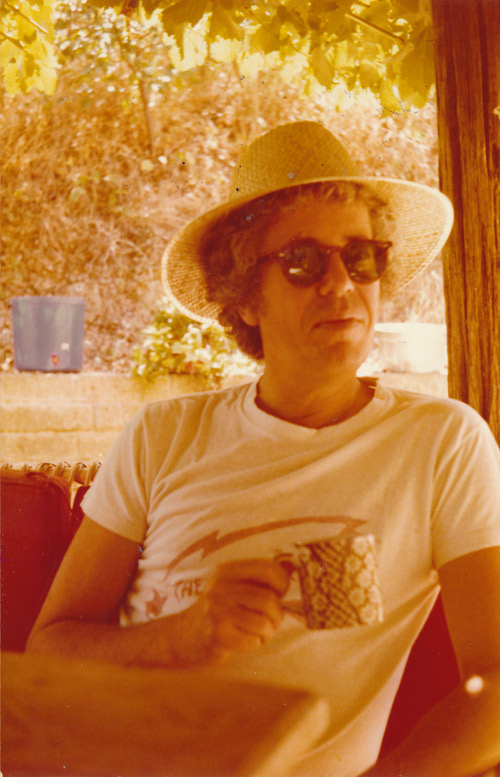Alla Rampa: Odyssey of an Unfinished Poem
In July 1978, Kenneth Koch sent me his new poem “At the Ramp, ovvero Alla Rampa” — or “Alla Rampa” as he referred to it in the letter that accompanied it. After living together for several years in New York and elsewhere, Kenneth and I and my two children (the “babies” mentioned mid-letter) had spent that spring in Rome, where he was teaching Italian schoolchildren to write poetry. In June, I’d returned with the kids to New York for a trial separation which later that summer became permanent. The poem — addressed to me or to the reader through me — is set in Rome and moves between metaphysical questions and the prior night’s post-concert dinner at the Ristorante Alla Rampa.
Kenneth Koch, August 1978. Photo credit: Katherine Koch.
Rediscovering “Alla Rampa” in my files a few years ago, I was struck by what a good poem it was — however unfinished. The Rome-drenched verve and charm of the letter that arrived with it was another surprise, bringing the moment of the poem’s writing to life.
The letter begins with a qualm about the poem, fills in factual details, and ends with a question about wording. The concert, he writes, took place in the Pincio Gardens above the Spanish Steps; the restaurant was at the foot of “the ramp” between the steps and the gardens. The pianist Frederic Rzewski, a friend of our friend Francesco Pellizzi, performed in the concert and was at the restaurant afterward, as were Julian Beck and Judith Malina, founders of The Living Theater. Marcello Panni, who with his wife Jeanne planned the evening, is the composer with whom Kenneth later wrote two operas. There’s also a recap of a day of sightseeing with his visiting daughter Katherine, just graduated from Berkeley, and her friend Callie. The rollicking look of the typing in both poem and letter, produced by the faulty shift key of his travel-battered Olivetti, adds to the sense of a Kochian time capsule.
•
In the late poem “To the Roman Forum,” about the night his daughter Katherine was born in Rome, Kenneth visits the Forum to ponder the event “at the twenty-five-espresso mark” of excitement. During our stay, the city’s beauty and brio could up the mark even on uneventful days — as could sitting at his desk writing poetry. Our sublet on the Via dei Coronari had a pretty rooftop view and an airy loft where he could write without disturbance. His lines in “Seasons on Earth” —
Each midday found meEcstatically in the present tense,Writing.
— weren’t about that time but could have been. At some point during the day, and usually again after dinner, he’d read me what he’d been writing. That spring, it was often “To Marina,” a long love poem that took years to write — note the word endlessness in the remark about it in his letter. Nearly as interesting to me as hearing the various versions were the ancillary philosophical conversations about the themes that wove through it — time, love, loss, poetry — themes “Alla Rampa” takes up more directly. The latter starts off at his writing desk, with musings about the poetic truth he is “always looking for,” before moving to the Ristorante Alla Rampa and wider reflections and ruminations.
•
The letter containing “Alla Rampa” was delayed in the mail, and the arrival of the poem just as we were breaking up muted the pleasure of reading it. I filed it away for my upcoming move, and I don’t think we ever discussed it. Luckily our friendship and collaborations continued: I remained his writing assistant for years afterward and we coauthored two books about reading and writing poetry.
Paul Celan’s idea of a poem as “a message in a bottle” seems to me especially apropos of “At the Ramp, ovvero Alla Rampa.” Not just a matter of how it showed up, redolent of another time, but of its letter-like tone, the vivid sense it gives of Kenneth at his Olivetti, the present-tense allegro of the endless search intact.
—Kate Farrell
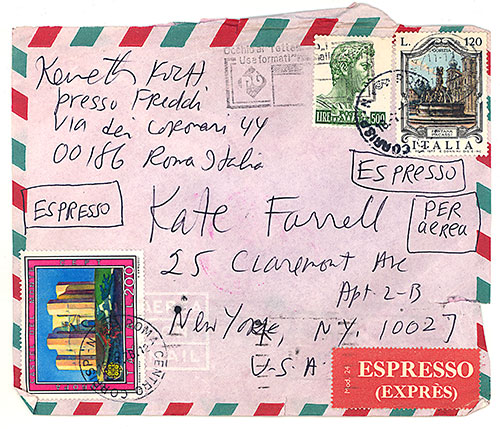
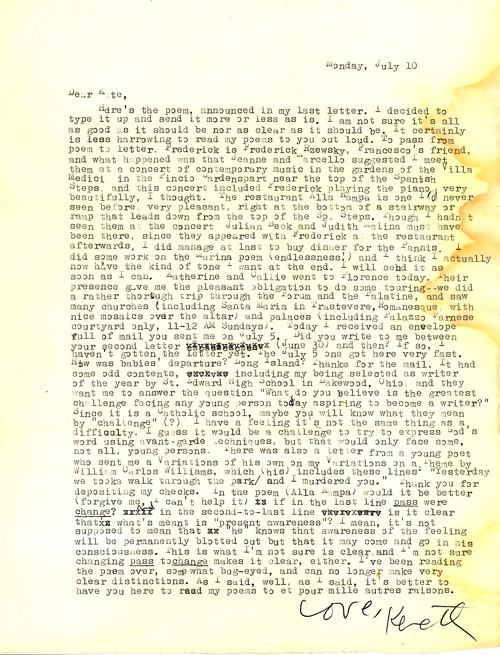
Monday, July 10
Dear Kate,
Here’s the poem, announced in my last letter. I decided to type it up and send it more or less as is. I am not sure it’s all as good as it should be nor as clear as it should be. It certainly is less harrowing to read my poems to you out loud. To pass from poem to letter, Frederic is Frederic Rzewski, Francesco’s friend, and what happened was that Jeanne and Marcello suggested I meet them at a concert of contemporary music in the gardens of the Villa Medici in the Pincio Gardenspart near the top of the Spanish Steps, and this concert included Frederic playing the piano, very beautifully, I thought. The restaurant Alla Rampa is one I’d never seen before, very pleasant, right at the bottom of a stairway or ramp that leads down from the top of the Sp. Steps. Though I hadn’t seen them at the concert, Julian Beck and Judith Malina must have been there, since they appeared with Frederic at the restaurant afterwards. I did manage at last to buy dinner for the Pannis. I did some work on the Marina poem (endlessness!) and I think I actually now have the kind of tone I want at the end. I will send it as soon as I can. Katherine and Callie went to Florence today. Their presence gave me the pleasant obligation to do some touring — we did a rather thorough trip through the Forum and the Palatine, and saw many churches (including Santa Maria in Trastevere, Romanesque, with nice mosaics over the altar) and palaces (including Palazzo Farnese courtyard only, 11–12 am Sundays). Today I received an envelope full of mail you sent me on July 5. Did you write to me between your second letter (June 30) and then? If so, I haven’t gotten the letter yet. The July 5 one got here very fast. How was babies’ departure? Long Island? Thanks for the mail. It had some odd contents, including my being selected as writer of the year by St. Edward High School in Lakewood, Ohio, and they want me to answer the question “What do you believe is the greatest challenge facing any young person today aspiring to become a writer?” Since it is a Catholic school, maybe you will know what they mean by “challenge” (?) I have a feeling it’s not the same thing as a difficulty. I guess it would be a challenge to try to express God’s word using avant-garde techniques, but that would only face some, not all, young persons. There was also a letter from a young poet who sent me a Variations of his own on my Variations on a Theme by William Carlos Williams, which (his) includes these lines: “Yesterday we took a walk through the park / and I murdered you.” Thank you for depositing my checks. In the poem (Alla Rampa) would it be better (forgive me, I can’t help it) if in the last line pass were change? And in the second-to-last line is it clear that what’s meant is “present awareness”? I mean, it’s not supposed to mean that “he” knows that awareness of the feeling will be permanently blotted out but that it may come and go in his consciousness. This is what I’m not sure is clear, and I’m not sure changing pass to change makes it clear, either. I’ve been reading the poem over, somewhat bug-eyed, and can no longer make very clear distinctions. As I said, well, as I said, it’s better to have you here to read my poems to et pour mille autres raisons.
Love,
Kenneth
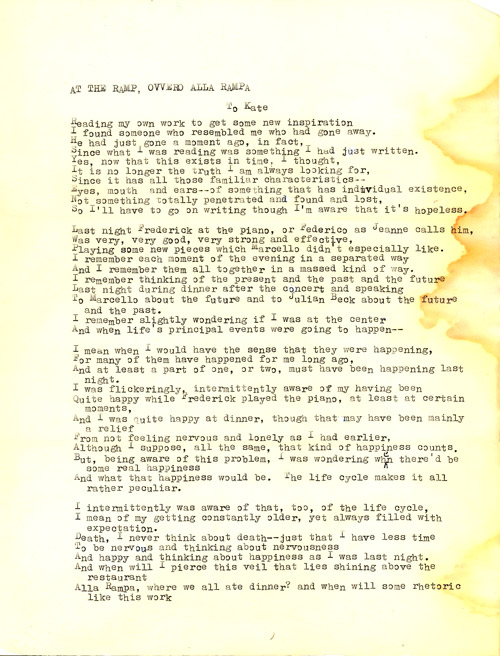
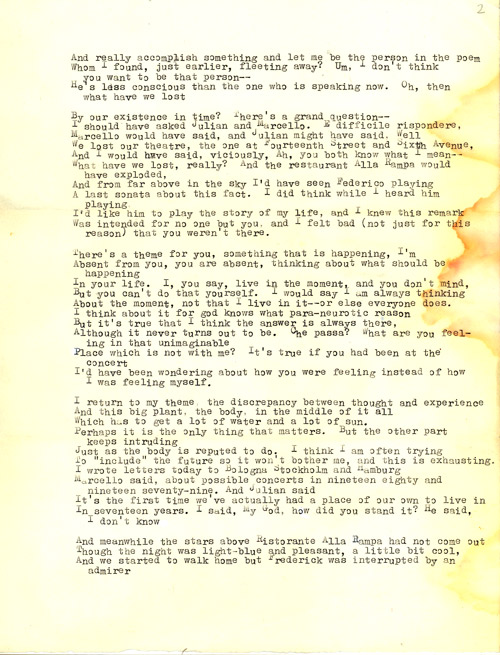
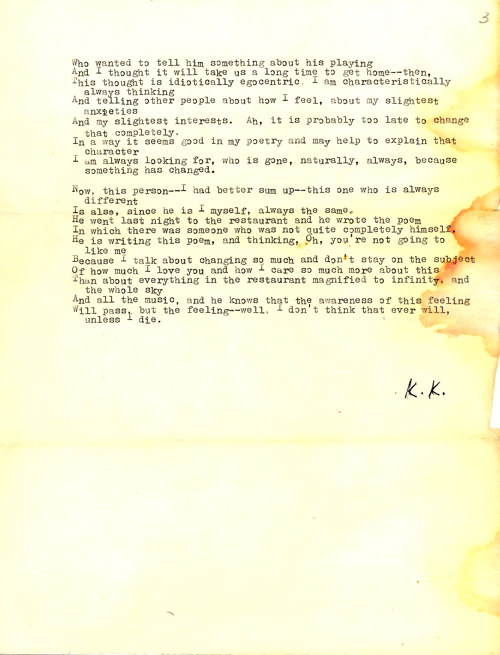
At the Ramp, ovvero Alla Rampa
To KateReading my own work to get some new inspirationI found someone who resembled me who had gone away.He had just gone a moment ago, in fact,Since what I was reading was something I had just written.Yes, now that this exists in time, I thought,It is no longer the truth I am always looking for,Since it has all those familiar characteristics —Eyes, mouth and ears — of something that has individual existence,Not something totally penetrated and found and lost,So I’ll have to go on writing though I’m aware that it’s hopeless.Last night Frederic at the piano, or Federico as Jeanne calls him,Was very, very good, very strong and effective,Playing some new pieces which Marcello didn’t especially like.I remember each moment of the evening in a separated wayAnd I remember them all together in a massed kind of way.I remember thinking of the present and the past and the futureLast night during dinner after the concert and speakingTo Marcello about the future and to Julian Beck about the future and the past.I remember slightly wondering if I was at the centerAnd when life’s principal events were going to happen —I mean when I would have the sense that they were happening,For many of them have happened for me long ago,And at least a part of one, or two, must have been happening last night.I was flickeringly, intermittently aware of my having beenQuite happy while Frederic played the piano, at least at certain moments,And I was quite happy at dinner, though that may have been mainly a reliefFrom not feeling nervous and lonely as I had earlier,Although I suppose, all the same, that kind of happiness counts.But, being aware of this problem, I was wondering when there’d be some real happinessAnd what that happiness would be. The life cycle makes it all rather peculiar.I intermittently was aware of that, too, of the life cycle,I mean of my getting constantly older, yet always filled with expectation.Death, I never think about death — just that I have less timeTo be nervous and thinking about nervousnessAnd happy and thinking about happiness as I was last night.And when will I pierce this veil that lies shining above the restaurantAlla Rampa, where we all ate dinner? and when will some rhetoric like this workAnd really accomplish something and let me be the person in the poemWhom I found, just earlier, fleeting away? Um, I don’t think you want to be that person —He’s less conscious than the one who is speaking now. Oh, then what have we lostBy our existence in time? There’s a grand question —I should have asked Julian and Marcello. E difficile rispondere,Marcello would have said, and Julian might have said, WellWe lost our theatre, the one at Fourteenth Street and Sixth Avenue,And I would have said, viciously, Ah, you both know what I mean —What have we lost, really? And the restaurant Alla Rampa would have exploded,And from far above in the sky I’d have seen Federico playingA last sonata about this fact. I did think while I heard him playingI’d like him to play the story of my life, and I knew this remarkWas intended for no one but you, and I felt bad (not just for this reason) that you weren’t there.There’s a theme for you, something that is happening, I’mAbsent from you, you are absent, thinking about what should be happeningIn your life. I, you say, live in the moment, and you don’t mind,But you can’t do that yourself. I would say I am always thinkingAbout the moment, not that I live in it — or else everyone does.I think about it for god knows what para-neurotic reasonBut it’s true that I think the answer is always there,Although it never turns out to be. Che passa? What are you feeling in that unimaginablePlace which is not with me? It’s true if you had been at the concertI’d have been wondering about how you were feeling instead of how I was feeling myself.I return to my theme: the discrepancy between thought and experienceAnd this big plant, the body, in the middle of it allWhich has to get a lot of water and a lot of sun.Perhaps it is the only thing that matters. But the other part keeps intrudingJust as the body is reputed to do. I think I am often tryingTo “include” the future so it won’t bother me, and this is exhausting.I wrote letters today to Bologna Stockholm and HamburgMarcello said, about possible concerts in nineteen eighty and nineteen seventy-nine. And Julian saidIt’s the first time we’ve actually had a place of our own to live inIn seventeen years. I said, My God, how did you stand it? He said, I don’t knowAnd meanwhile the stars above Ristorante Alla Rampa had not come outThough the night was light-blue and pleasant, a little bit cool,And we started to walk home but Frederic was interrupted by an admirerWho wanted to tell him something about his playingAnd I thought it will take us a long time to get home — then,This thought is idiotically egocentric, I am characteristically always thinkingAnd telling other people about how I feel, about my slightest anxietiesAnd my slightest interests. Ah, it is probably too late to change that completely.In a way it seems good in my poetry and may help to explain that characterI am always looking for, who is gone, naturally, always, because something has changed.Now, this person — I had better sum up — this one who is always differentIs also, since he is I myself, always the same.He went last night to the restaurant and he wrote the poemIn which there was someone who was not quite completely himself.He is writing this poem, and thinking, Oh, you’re not going to like meBecause I talk about changing so much and don’t stay on the subjectOf how much I love you and how I care so much more about thisThan about everything in the restaurant magnified to infinity, and the whole skyAnd all the music, and he knows that the awareness of this feelingWill pass, but the feeling — well, I don’t think that ever will, unless I die.K.K.
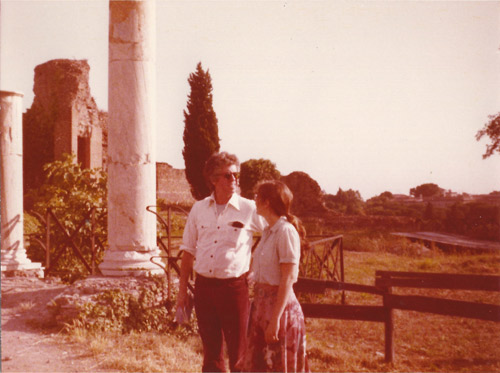
Kenneth Koch and Katherine Koch on Palatine Hill, taken by Caroline “Callie” Hancock, 1978.
Acknowledgments
Poetry magazine and the Poetry Foundation would like to thank the Kenneth Koch Literary Estate for permission to publish Kenneth Koch’s unfinished poem “At the Ramp, ovvero Alla Rampa” and his letter to Kate Farrell. We appreciate the time and thought Kenneth Koch’s literary executors Karen Koch, Jordan Davis, and Ron Padgett gave to this project. We also thank Katherine Koch and David Shapiro for their generous help and advice.
The poems cited by Kate Farrell in her introductory note are “To the Roman Forum” and “To Marina” from The Collected Poems of Kenneth Koch (2005) and “Seasons on Earth” from On the Edge: Collected Long Poems by Kenneth Koch (2007), both published by Alfred A. Knopf.
Kate Farrell is the author of seven books, most recently a collection of poems, Visiting Night at the Academy of Longing (Lavender Ink, 2016).
Prize-winning author Kenneth Koch published numerous collections of poetry, avant-garde plays, and short fiction while also serving as one of the nation’s best-known creative writing teachers during a career that spanned over five decades. Associated with the New York School of poetry for most of his career, Koch used surrealism,...
-
Related Collections
-
Related Authors
-
Related Podcasts
- See All Related Content

